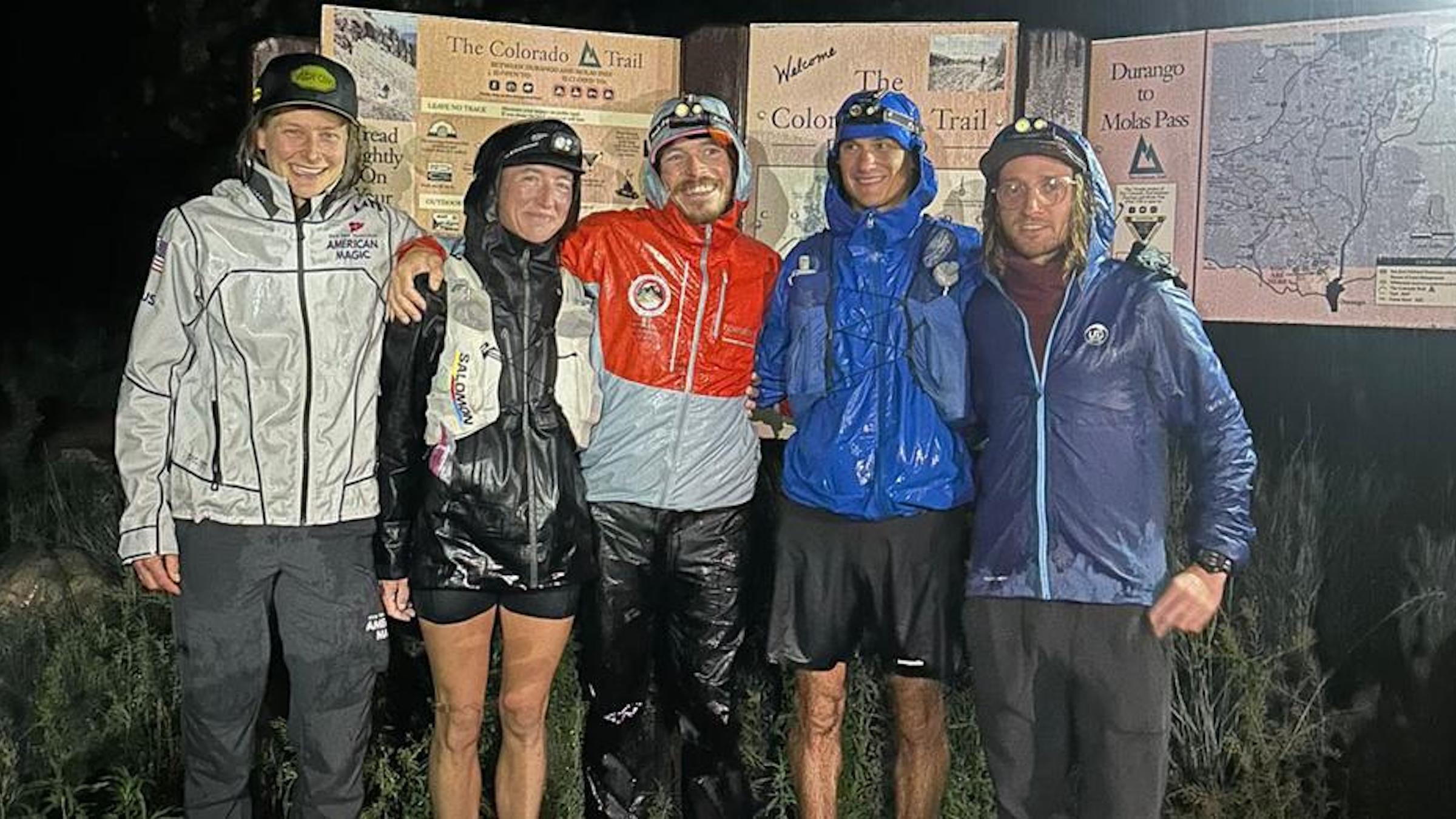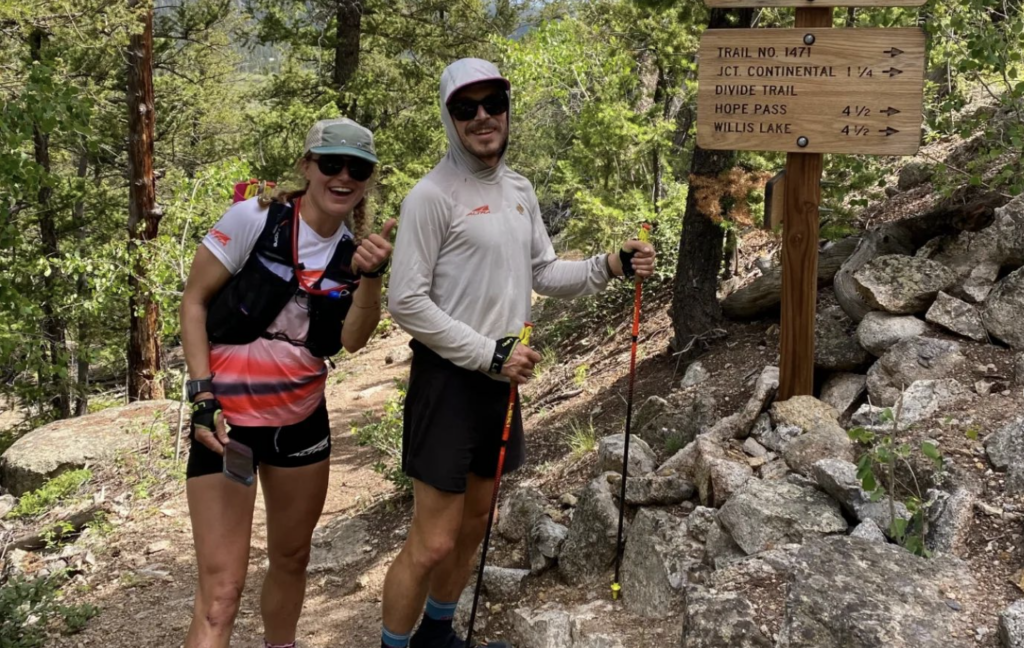This Hiker Just Bagged 487 Miles in a Week. It Left Him in the Hospital

Curtin stands with his support team at the terminus of the Colorado Trail. (Photo: Courtesy of Kyle Curtin)
On June 30, Kyle Curtin stumbled to the southern terminus of the Colorado Trail, claiming the trail’s overall Fastest Known Time (FKT) by a full day. Then, he was taken to the hospital.
For years, hikers on the Colorado Trail—an ultraclassic, 487-mile backpacking route extending from Denver to Durango—have fought to break the mythical seven-day barrier. Curtin’s effort finally proved it could be done. But to notch the record, he had to hike, jog, and shuffle nearly nonstop for 6 days, 15 hours, and 8 minutes. He slept about 12 hours total over the entire course of the attempt.
On day one, Curtin tackled 100 miles at a blazing pace. Day two was similarly ambitious with a 75-miler, although Curtin wrote that he began feeling the effects of altitude at that stage. (Most of the trail is above 10,000 feet in elevation.) By the end of day four, Curtin had passed the 300-mile marker. But the record didn’t come without a cost.
In the last 100 miles, Curtin’s ankle began to swell. “That was definitely the most limiting factor by the end. I couldn’t really get my toes to go up,” Curtin told Backpacker. “It wasn’t 10 out of 10 pain the whole time. It slowly built up over the last 24 to 30 hours.”
To manage the pain, Curtin lingered at creek crossings, and got creative at high elevations, “I’d pack snow into my socks,” he said.
In an Instagram post, Curtin wrote, “By the final miles it was absolutely unbearable, but luckily by that point the only way to bail was to get to the finish.” Shortly after finishing, he got a ride to a nearby hospital, where he went through seven IV bags and spent 36 hours recovering. A week after finishing the trail, Curtin is still struggling to walk normally. The injury was diagnosed as tendinitis. Curtin was also diagnosed with rhabdomyolysis, a condition in which muscle tissue starts to breakdown from excessive exertion. He is expecting to make a full recovery.
The true cost of an FKT
Curtin’s experience isn’t unique. Other hikers attempting FKTs this season have dropped out for a number of reasons, ranging from heat exhaustion on the PCT to severe hamstring tendinitis on the AT. The results have left many onlookers wondering: What’s the real cost of an FKT—and is it really worth it?
While anecdotal evidence abounds, actual scientific research on the physical toll of thru-hiking is minimal. Previous studies have suggested that thru-hiking could be bad for your health, at least from a nutritional perspective. Fast-paced thru-hiking is even harder on the body. Supported speed attempts, like Curtin’s, often involve more running than walking. That kind of mega-endurance feat comes with some serious risks—include heart maladaptations, kidney damage, possible increased likelihood of arthritis and, of course, tendinitis. However, with the right level of care and personalized training, experts say, there may be ways to mitigate those risks. The question of whether it’s worth it comes down to the individual athlete.
Other challenges
Injury isn’t the only major obstacle modern speed hikers have to face. The longer the route, the more room there is for logistics to run amok. Curtin and his team faced a wildfire near Leadville, Colorado, likely caused by negligent campers. Dubbed the Interlaken Fire, the blaze grew to a size of 704 acres, and quickly shut down the Colorado Trail’s Collegiate West route—the path Curtin originally intended to take.
Curtin’s re-route shortened his hike by a few miles, but he took comfort in knowing that the alternate was still longer than the Collegiate East route—a popular, shorter version of the Colorado Trail.

Though Curtin’s injuries almost threatened his record, smart planning set him up for success. He managed to time his attempt in such a way that he faced minimal impact from lingering high-elevation snow. The weather was mild. He also stated that a 2017 thru-hike of the Colorado Trail put him at an advantage to set a record this year since he was familiar with the trail and its various access points.
Curtin says his love affair with long-distance endeavors far pre-dates his first Colorado Trail thru-hike. In 2015 he hiked the Appalachian Trail, and he’s been racking up 100-mile races and ultras for more than a decade. That gave him the tools—and relationships—he needed to pull off this supported thru-hike. His team included a roster of rock-star athletes like Tara Dower, a former CT record holder, and Courtney Dauwalter, a trail-running celebrity.
“[That team] is one of the things I’m glad came together,” Curtin said.
A rising star
The Colorado Trail was not Curtin’s first FKT, but it was his longest by more than double the distance. In 2020, he snagged the unsupported record on the Tahoe Rim Trail—a 165-mile route. Later that year, he set a supported record on North Carolina’s 67-mile Pitchell route, as well.
While each route came with its own challenges, the Colorado Trail was of a different magnitude. “This one was so much more involved and so logistically complex. I think we had 45 different crew spots along the way, ” he said. The staggering length and intensity of the Colorado Trail made it a major step up for Curtin.
When asked what challenges are coming next, he laughed.
“Oh, I’m canceling adventure plans,” Curtin said. “I don’t have anything on the radar.” At least, not yet.